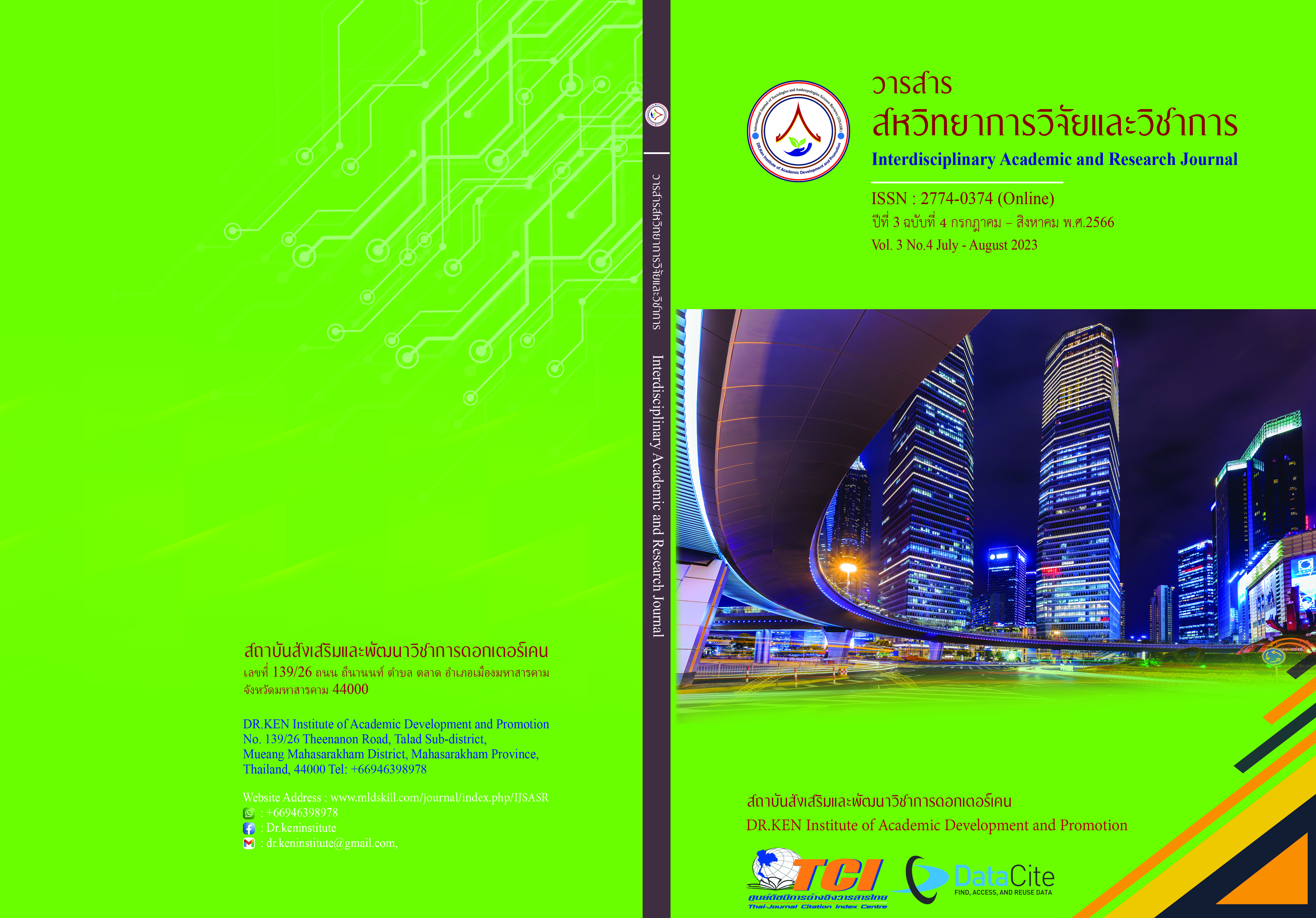Civil Political Development in Local Democracy
DOI:
https://doi.org/10.14456/iarj.2023.203Keywords:
Civil Politics; , Local DemocracyAbstract
Politics, elections, and local democracy are fundamentally democratic or Thailand's foundational democracy because it is an important channel for local people to have space to express their opinions, complaints, and presentations of their needs to representatives in local government organizations which may be overlooked Therefore, this article aims to study 1. Principles and importance of local elections. which is a process for electing representatives at the local level according to democratic principles; and 2. development of regional politics. citizens that affect democracy at the local level by relying on documents, textbooks, academic articles, and related research, etc., by explaining the dynamics of Thai political culture at the local level, principles, and the importance of local elections. The relationship between local politics and national politics and local political development in Thailand. To develop civil society and democracy at the local level It is the fundamental democracy of the country. to the development of politics, elections, and democracy at the local level. The results of the study revealed that the development of civil politics in democracy at the local level focuses on selecting representatives to manage public services to meet the needs of the people. It has an important duty to support development and provide opportunities for the participation of the local people, which requires cooperation and development in parallel between the people and local government organizations in civic politics development in the local democratic system. There are 7 components as follows: (1) Promotion of democratic education at the local level. (2) Issuing policies to allow the public to participate in the process. (3) Increasing the power of mass communication and opening channels for political communication at the local level. (4). Increasing the power of monitoring, auditing, and evaluating the work of local politicians from the people's sector. (5). Reduce the influence and role of the leader in Serve during the election period. (6). Development support. Human resources in local democratic communities. And (7) Human resource development processes at the community local level to develop people's politics in the local democratic system to achieve goals with efficiency and sustainability.
References
โกวิทย์ พวงงาม และคณะ. (2557). บทบาทสำนักงานคณะกรรมการการเลือกตั้งกับการเสริมสร้างความ เข้มแข็งให้กับพรรคการเมืองในการพัฒนาประชาธิปไตย: ปัญหา อุปสรรค และแนวทางแก้ไข. วารสารวิชาการ Veridian E-Journal, Silpakorn University. ฉบับมนุษยศาสตร์สังคมศาสตร์และศิลปะ. 7(1), 43-61.
โกวิทย์ พวงงาม. (2563). คู่มือเลือกตั้งท้องถิ่น. มูลนิธิคอนราด อาเดนาวร์ สำนักประเทศไทย นนทบุรี: บริษัท ธรรมสาร จำกัด
จรัส สุวรรณมาลา. (2550). วัฒนธรรมการเมืองท้องถิ่นในประเทศไทย. วารสารสถาบันพระปกเกล้า. 5(3), 83-106.
ชนินธร ม้าทอง และคณะ. (2557). ศึกษาเปรียบเทียบปฏิสัมพันธ์ทางการเมืองระหว่างนักการเมืองท้องถิ่นกับประชาชนก่อนและหลังได้รับเลือกตั้งในเขตพื้นที่อำเภอเมือง จังหวัดมหาสารคาม. วารสารมหาวิทยาลัยราชภัฏมหาสารคาม (มนุษยศาสตร์และสังคมศาสตร์). 8(1), 159-168.
ชลัช ชรัญญ์ชัย. (2556). การพัฒนาท้องถิ่นภายใต้ระบอบประชาธิปไตย:ข้อเสนอการให้องค์ความรู้และการมีส่วนร่วมทางการบริหารท้องถิ่นเบื้องต้นแก่ผู้เรียน. วารสารการจัดการสมัยใหม่. 11(2), 21-29.
บวรศักดิ์ อุวรรณโน. (2554). ประชาธิปไตยแบบมีส่วนร่วม (Participatory Democracy). กรุงเทพมหานคร: บริษัท พริ้นติ้ง ฮอลล์ จำกัด.
ปธาน สุวรรณมงคล. (2554). การเมืองท้องถิ่น: การเมืองของใครโดยใครเพื่อใคร. กรุงเทพมหานคร: จตุพรดีไซด์.
ภวัต พัฒนนิภากร. (2563). รูปแบบพฤติกรรมทางการเมืองในระดับท้องถิ่นของกลุ่มชาติพันธุ์ในพื้นที่จังหวัดภาคเหนือตอนล่าง 1 ภายใต้อิทธิพลของพลวัตทางการเมือง. วิทยานิพนธ์ปริญญารัฐประศาสนศาสตร์ดุษฎีบัณฑิต. มหาวิทยาลัยราชภัฏมหาสารคาม.
วิชชุกร นาคธน. (2561). นักการเมืองถิ่นจังหวัดพระนครศรีอยุธยา. วารสารครุศาสตร์ปริทรรศน์ฯ. 5(2), 1- 15.
ศราวิน ปานชัย. (2566). “บ้านใหญ่” ผู้มากบารมีกำหนดทิศทางการเมืองไทย. ศิลปวัฒนธรรม. Retrieved on 2 May 2023. https://www.silpa-mag.com/history/article_105279.
ศิลปะวิชญ์ น้อยสมมิตร และโชติกา แก่นธิยา.(2562). การมีส่วนร่วมของภาคประชาชนต่อนโยบายสาธารณะ. วารสารวิจยวิชาการ. 2(1), 101-116.
สำนักเลขาธิการสภาผู้แทนราษฎร. (2561). การมีส่วนร่วมทางการเมืองในระบอบประชาธิไตย. สำนักประชาสัมพันธ์ สำนักเลขาธิการสภาผู้แทนราษฎร. กรุงเทพมหานคร: สำนักการพิมพ์สำนักเลขาธิการสภาผู้แทนราษฎร.
สิริมาส หมื่นสาย ธนาภรณ์ แสวงทอง และภวัต พัฒนนิภากร. (2565). กลยุทธ์การสื่อสารทางการเมืองของนโยบายประชานิยม. วารสารการบริหารนิติบุคคลและนวัตกรรมท้องถิ่น. 8(3), 383-396.
สุนทรชัย ชอบยศ และรจนา คำดีเกิด. (2556). การเมืองภาคพลเมือง: การถอดถอนผู้บริหารท้องถิ่นที่ประสบความสำเร็จในประเทสไทย. รัฐสภาสาร. 61(5), 9-43.
สุพัฒน์จิตร ลาดบัวขาว. (2561). การเลือกตั้งท้องถิ่น: ข้อจำกัดของกระบวนการประชาธิปไตย. วารสารล่มพฤกษ์ มหาวิทยาลัยเกริก. 36(2), 169-197.
เสกสรรค์ สนวา, อภิชาติ ใจอารีย์ และระวี สัจจโสภณ. (2563). สังเคราะห์กระบวนการพัฒนาทรัพยากรมนุษย์สู่ความเป็นชุมชนประชาธิปไตย. วารสารการเมืองการปกครอง มหาวิทยาลัยมหาสารคาม. 11(3), 46-65.
เสกสรรค์ ประเสริฐกุล. (2552). การเมืองภาคประชาชนในระบอบประชาธิปไตย. กรุงเทพมหานคร: สำนักพิมพ์วิภาษา.
อเนก เหล่าธรรมทัศน์. (2545). ประชาธิปไตยท้องถิ่น: สาระสำคัญของการเมืองและการปกครองส่วนท้องถิ่น. นนทบุรี: สำนักพิมพ์มิติใหม่.
Rallings, C., & Thrasher, M., (1997). Local Elections in Britain. New York: Routledge.
Catt H. (1999). Democracy in Practice. London: Routledge.
Downloads
Published
How to Cite
Issue
Section
License
Copyright (c) 2023 Thawan Rattana, Thanison Phongphitakyotin, Pattaradanai Maiphranate, Phasakorn Dokchan

This work is licensed under a Creative Commons Attribution-NonCommercial-NoDerivatives 4.0 International License.
Copyright on any article in the Interdisciplinary Academic and Research Journal is retained by the author(s) under the under the Creative Commons Attribution-NonCommercial-NoDerivatives 4.0 International License. Permission to use text, content, images, etc. of publication. Any user to read, download, copy, distribute, print, search, or link to the full texts of articles, crawl them for indexing, pass them as data to software, or use them for any other lawful purpose. But do not use it for commercial use or with the intent to benefit any business.
















.png)


